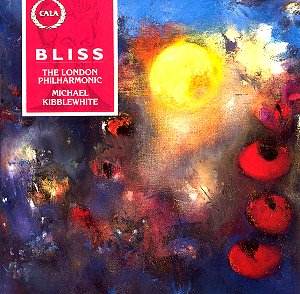This project originated in the Bliss centenary celebrations
back in 1991, although the recording was only completed and the disc
issued the following year. This remains an important performance of
a major work - Morning Heroes - which perhaps ranks as the most central
achievement in the composer's catalogue.
Above all the recording benefits from the excellent
playing of the London Philharmonic, which has been admirably captured
by the Cala engineers. Kibblewhite directs a deeply felt and dramatic
performance of Morning Heroes, which Bliss described as 'a tribute to
my brother and all my comrades-in-arms who fell in the Great War'. This
symphony for orator, chorus and orchestra is an hour in duration and
sustains its ambitious time-scale by virtue of its vivid commitment
and imaginative inspiration, drawing upon various poets, including Walt
Whitman, Wilfred Owen, Robert Nicholls and The Iliad.
While most of the texts are delivered in sung form
by the chorus, some are narrated in the context of atmospheric instrumentation.
Brian Blessed captures the spirit of the work, but his delivery might
have been more measured, in the manner used so successfully by John
Westbrook in the EMI recording conducted by Sir Charles Groves.
The choral singing brings a special intensity to this
performance, and it is no surprise to learn that Michael Kibblewhite
was the founder and director of all three (a bust schedule no doubt).
The ensemble, while complex, is always strongly disciplined, and the
recorded perspective generally succeeds in allowing details to be heard,
sonorities to be experienced. The fast music, such as the setting of
Owen's The Heroes, particularly gains from this approach, and has real
intensity.
There are two interesting bonus items preceding the
major work on the programme. The LPO give a resounding rendition of
the Investiture Antiphonal Fanfare, which for all its brevity is an
imposing piece. For contrast the Prayer of St Francis of Assisi, of
which this was the first ever recording, uses unaccompanied female voices
only. While its material is hardly memorable, it is imaginatively layered
in sound and creates a beautiful atmosphere.
The booklet is packed with information, including an
extended essay by Giles Easterbrook, while full texts are also provided.
A distinguished disc, which does credit to all concerned.
Terry Barfoot


